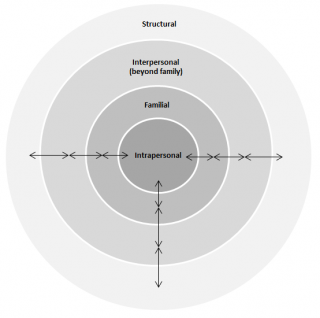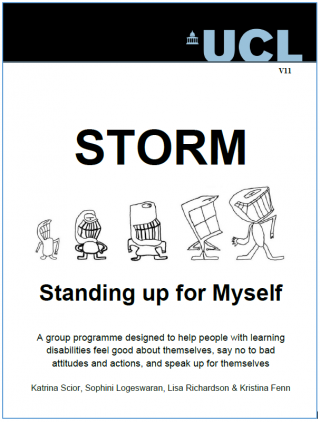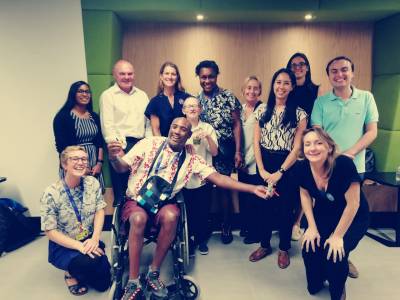Our work is based on a firm conviction that disability stigma needs to be challenged at multiple levels.

To this end, alongside our research focused at the intrapersonal, familial and interpersonal levels, we advise relevant bodies on how to achieve structural change. Organisations we have provided such advice to include: the Royal Mencap Society, Special Olympics International, and the United Nations Committee tasked with overseeing the Convention on the Rights of Persons with Disabilities (CRPD).
Current Research Projects
1. The STORM programme
Lead: Katrina Scior

This project consists of the development and evaluation of a new psychosocial group intervention designed to increase the capacity of people with intellectual disabilities to manage and resist stigma. The intervention developed as part of this project is called STORM (Standing Up For Myself). It draws on cognitive behavioural and narrative approaches, as well as liberation psychology in aiming to support people with intellectual disability to cope with and stand up to the stigma they often have to face on account of having an intellectual disability.
An initial pilot of the STORM programme was funded by the Baily Thomas Charitable Fund and completed in September 2018.

Adaptation and Pilot study of Digital STORM
We are currently conducting an adaptation and pilot study of STORM for digital delivery, funded by the National Institute of Health Research (NIHR) Public Health Research Programme (project number 17/149/03). This study is being conducted in partnership with Mencap and the Foundation for People with Learning Disabilities.
The Covid-19 pandemic and associated social restrictions have changed the way in which organisations are delivering services and support, including to people with intellectual disabilities. In response to lockdown and the need for distancing, services have largely suspended face-to-face meetings and have supported their members through virtual methods such as web-based video meetings. Many organisations anticipate that they may continue to use virtual methods for the foreseeable future, with self-advocates and facilitators of groups claiming that some prefer virtual methods as it provides people with ID the opportunity to continue to interact with others in a familiar and safe environment. Virtual methods have removed some of the barriers faced by some people attending face-to-face groups and accessing support such as travel anxiety, reliance on support and lower motivation to attend in the winter months.
The immediate need for and importance of STORM to help people with ID to discuss negative experiences with their peers and resist stigma has been highlighted during this time by self-advocates and ID third-sector organisations. Please refer to this UCL Unit for Stigma Research blog post for further insight into the experiences of Covid-19 and the associated restrictions for people with learning disabilities.
Digital interventions are increasingly available to the general public and are widening access to healthcare. People with ID are mostly excluded from e-health provision and related research and are excluded from the growing benefits that digital health/psychosocial interventions have to offer. By adapting STORM to digital STORM, we are contributing to much needed research on the use of digital interventions with people with ID. Digital STORM will potentially allow more groups of people with ID to develop stigma resistance and to improve their self-esteem and mental wellbeing. This is in line with the long-term goal to offer STORM as a widely and freely accessible public health intervention.
Read more about this project
2. The effects of an e-intervention designed to reduce disability stigma in Bangladesh
Lead: Konenica (Konnie) Ali
This study aims to test the effectiveness of an e-intervention integrating education and indirect film-based contact in raising awareness about intellectual disabilities and reducing public stigma in Bangladesh. In Bangladesh, there are high rates of stigma for people with intellectual disabilities, many of which are treated using unconventional methods which can result in death. Considering the literature which indicates that stigma exists in Bangladesh due to societal and religious beliefs, it is believed that an e-intervention may be beneficial in reducing public attitudes towards people with intellectual disabilities. This study will utilise a feasibility randomised control trial group online. Preliminary effects on a range of clinical outcomes will be reported. This study is being conducted in partnership with BRAC University’s School of Public Health and the Bangladesh Disabled Disability Trust (BDDT).
3. Past Projects
Other projects under the umbrella of UCLUS seek to advance our understanding of intellectual disability stigma, its impact on people with intellectual disabilities and their families, and effective ways to challenge stigma faced by people with intellectual disabilities. Below is a list of researchers and current projects they are leading:
Stigma resistance among self-advocates with intellectual disabilities
Nikolaos (Nikos) Sarras
Nikos is a UCL trained clinical psychologist. For his DClinPsy thesis he explored what enables self-advocates to resist stigma in their everyday lives and what can get in to way of resisting negative attitudes and behaviours. This project was supervised by Katrina Scior and Lisa Richardson.
Measuring stigma resistance in adults with intellectual disabilities
Abigail (Abi) Goldsmith-Sumner
Abi is a UCL trained clinical psychologist. For her DClinPsy thesis, Abi developed a measure of stigma resistance in individuals with intellectual disabilities, under the supervision of Katrina Scior and Andrew Jahoda (Glasgow Univ.).
How parents of children with intellectual disabilities and/or autism respond to and manage stigma they may experience
Rachel Ransley
Rachel completed this study in 2020 as part of her Doctorate in Clinical Psychology thesis. The study explored how parents of children with learning disabilities and/or autism manage stigma they may experience in their daily lives, in relation to their child's disability. ‘Affiliate stigma’ occurs when associates (e.g. parents, other family members, partners and friends) of a person who is stigmatised in society find themselves the targets of Stigma (i.e. negative stereotypes, prejudice and/or discrimination). At times these associates internalise stigmatising attitudes and beliefs. Recent research by UCLUS (Mitter, Ali, and Scior, 2018, 2019) shows that parents of children with learning disabilities and/or autism are often vulnerable to affiliate stigma and can internalise stigmatising beliefs which can affect their view of themselves, their mental health and well-being.
By exploring this topic, we gained an understanding of how parents respond to stigma associated with their child's disability in the moment, what strategies they may use to resist stigmatisation, and how they build resilience to others’ negative responses. It is hoped that sharing the insights from this research will help to support other parents of children with learning disabilities and/or autism in resisting the negative effects of stigma.
 Close
Close

